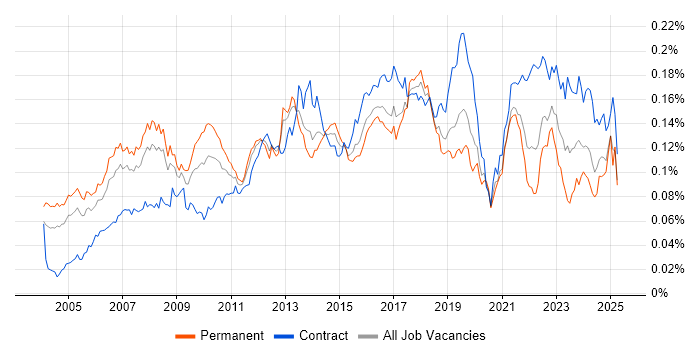ERP Manager
UK
The median ERP Manager salary in the UK is £62,500 per year, according to job vacancies posted during the 6 months leading to 31 May 2025.
The table below provides salary benchmarking and summary statistics, comparing them to the same period in the previous two years.
| 6 months to 31 May 2025 |
Same period 2024 | Same period 2023 | |
|---|---|---|---|
| Rank | 647 | 788 | 869 |
| Rank change year-on-year | +141 | +81 | +297 |
| Permanent jobs requiring an ERP Manager | 55 | 119 | 99 |
| As % of all permanent jobs advertised in the UK | 0.098% | 0.11% | 0.10% |
| As % of the Job Titles category | 0.11% | 0.12% | 0.11% |
| Number of salaries quoted | 44 | 87 | 65 |
| 10th Percentile | - | £42,000 | £47,500 |
| 25th Percentile | £54,793 | £46,875 | £52,500 |
| Median annual salary (50th Percentile) | £62,500 | £60,000 | £65,000 |
| Median % change year-on-year | +4.17% | -7.69% | +8.33% |
| 75th Percentile | £80,000 | £81,250 | £71,250 |
| 90th Percentile | £83,000 | £87,500 | £77,500 |
| UK excluding London median annual salary | £62,500 | £56,000 | £65,000 |
| % change year-on-year | +11.61% | -13.85% | +18.18% |
All Permanent IT Job Vacancies
UK
For comparison with the information above, the following table provides summary statistics for all permanent IT job vacancies. Most job vacancies include a discernible job title that can be normalized. As such, the figures in the second row provide an indication of the number of permanent jobs in our overall sample.
| Permanent vacancies in the UK with a recognized job title | 50,444 | 98,297 | 87,491 |
| % of permanent jobs with a recognized job title | 90.33% | 94.81% | 91.34% |
| Number of salaries quoted | 26,384 | 69,991 | 55,965 |
| 10th Percentile | £28,750 | £28,500 | £32,500 |
| 25th Percentile | £40,748 | £38,500 | £45,000 |
| Median annual salary (50th Percentile) | £55,000 | £52,500 | £60,000 |
| Median % change year-on-year | +4.76% | -12.50% | - |
| 75th Percentile | £73,750 | £70,000 | £80,000 |
| 90th Percentile | £95,000 | £90,000 | £100,000 |
| UK excluding London median annual salary | £51,000 | £50,000 | £53,500 |
| % change year-on-year | +2.00% | -6.54% | +6.49% |
ERP Manager
Job Vacancy Trend
Job postings that featured ERP Manager in the job title as a proportion of all IT jobs advertised.

ERP Manager
Salary Trend
3-month moving average salary quoted in jobs citing ERP Manager.
ERP Manager
Salary Histogram
Salary distribution for jobs citing ERP Manager over the 6 months to 31 May 2025.
ERP Manager
Top 14 Job Locations
The table below looks at the demand and provides a guide to the median salaries quoted in IT jobs citing ERP Manager within the UK over the 6 months to 31 May 2025. The 'Rank Change' column provides an indication of the change in demand within each location based on the same 6 month period last year.
| Location | Rank Change on Same Period Last Year |
Matching Permanent IT Job Ads |
Median Salary Past 6 Months |
Median Salary % Change on Same Period Last Year |
Live Jobs |
|---|---|---|---|---|---|
| England | +108 | 44 | £62,500 | - | 18 |
| UK excluding London | +154 | 43 | £62,500 | +11.61% | 14 |
| Work from Home | +120 | 25 | £63,750 | -17.74% | 9 |
| North of England | +28 | 19 | £54,793 | +21.76% | 7 |
| North West | -8 | 15 | £54,793 | +21.76% | 6 |
| Scotland | - | 9 | £62,500 | - | 1 |
| London | +77 | 8 | £75,000 | -11.76% | 5 |
| South East | +70 | 7 | £86,250 | +18.97% | 2 |
| Yorkshire | +56 | 4 | £62,500 | +13.64% | 1 |
| East of England | +46 | 3 | £80,000 | +42.86% | |
| South West | +113 | 2 | £73,500 | -10.91% | |
| Midlands | +51 | 2 | £67,500 | +22.73% | 2 |
| West Midlands | +50 | 2 | £67,500 | +42.11% | 2 |
| Northern Ireland | - | 1 | £50,000 | - |
ERP Manager Skill Set
Top 30 Co-occurring Skills and Capabilities
For the 6 months to 31 May 2025, ERP Manager job roles required the following skills and capabilities in order of popularity. The figures indicate the absolute number co-occurrences and as a proportion of all permanent job ads featuring ERP Manager in the job title.
|
|
ERP Manager Skill Set
Co-occurring Skills and Capabilities by Category
The follow tables expand on the table above by listing co-occurrences grouped by category. The same employment type, locality and period is covered with up to 20 co-occurrences shown in each of the following categories:
